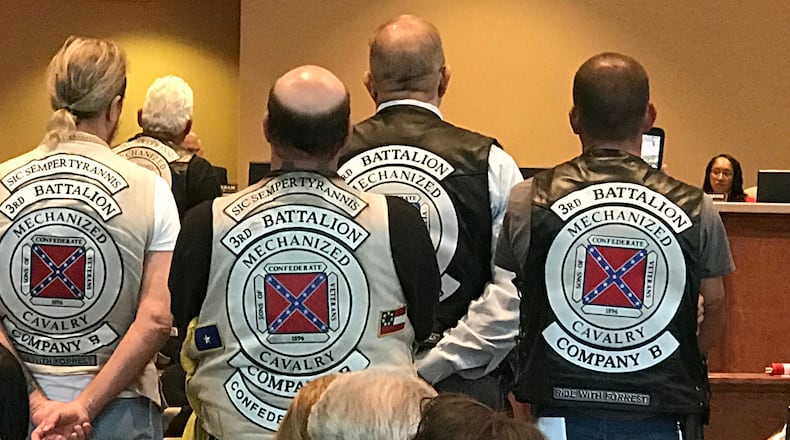Supporters and opponents of the Confederate flag packed the Henry County Commission chamber Tuesday, some to protest the removal of the battle emblem from the county-owned Nash Farm Battlefield, others to celebrate it.
As each person came forward to speak, their supporters rose in solidarity. The removal of the flag from Nash Farm and the closing of an on-site museum have clearly split the county along racial and ideological lines.
“The words ‘stand up against hate’ have been a false battle cry for those who have refused to sit down with those of us who hold a different insight into a complex and difficult time in American history,” said Anthony Pilgrim, a Henry County resident and member of the Sons of Confederate Veterans.
Behind him stood a phalanx of his brothers in leather vests emblazoned with emblems of the Confederacy. They were all white. When he finished his brothers and several white audience members applauded.
When Sarah Billups, a tall African-American woman approached the podium, a different group rose. Most of them were African-American and some wore gold and blue NAACP crests. Billups held up both the red, black and green pan-African flag and the American flag. She was adamant that the rebel emblem not fly over county property, as it had for years at Nash Farm.
“When you fly the Confederate flag at your home, that’s your business,” said Billups, a Henry County NAACP officer. “Do not force me to operate under the shadow of that flag.”
As she spoke her supporters cheered. The other side was silent.
And so it went for more than four hours in the packed county government auditorium Tuesday as commissioners heard from residents wrestling with an issue that has plagued the South for decades if not 150 years: Should the Confederate flag fly over government-owned property?
Several carried signs demanding the resignation of Commissioner Dee Clemmons, the African-American board member who asked that the Confederate flag be taken down at the battlefleld. Amid an argument about the display of flags inside the small museum on the grounds, the museum abruptly closed.
There was also a contingent of NAACP supporters at the commission meeting on Tuesday. The state NAACP issued a statement before Tuesday’s meeting imploring the commission not to fly the flag at the battlefield anymore. Police presence was heavy both inside and outside the county government building.
“This, too, shall pass,” Clemmons said during a break in the more than four-hour commission meeting. “I’m not afraid of anybody here.”
‘A gentlemen’s agreement’
The museum’s board decided to close the exhibits and shut down the 7-year-old facility last month after the donor, upset over Clemmons’ requests, packed up his thousands of artifacts and left the display cases virtually empty.
Clemmons asked that battle flags be removed from view at the front of the property. The 204-acre farm is in her district.
But at the end of Tuesday’s meeting, both County Manager Cheri Matthews and County Attorney Patrick Jaugstetter said they could find no record of any ordinance, resolution or application that would have authorized Friends of Nash Farm to run a museum there.
“As a general rule, those types of things are brought to the board for action,” said Jaugstetter.
Matthews said her staff has looked through county records for weeks and found no evidence that Friends of Nash Farm, which operated the museum, entered into a formal contract with the county.
“All it could have been was a gentleman’s agreement or handshake between them and a former commissioner,” Matthews said. “But I can’t speak about how it happened. I found nothing that showed any official action.”
Clemmons said afterward that lack of a formal agreement meant all of the fighting had been pointless.
“You mean to tell me we’ve gone through all this and they were in there squatting,” she said. “They’re the ones calling for my resignation, but they’re in there squatting. No rent, no lease, no nothing.”
Clemmons said she did not ask the museum to get rid of all its Confederate items, only to relocate them elsewhere in the museum. She said she’d received complaints from constituents who were offended by the flag.
The museum’s board, however, said in Facebook posts and interviews that Clemmons had pressured them to remove all references related to the Confederacy.
‘We’ve got to work together’
The majority of the speakers decried what they said was an attack on their Southern heritage, citing not only Nash Farm, but the removal of Confederate iconography from New Orleans to South Carolina.
“I don’t wish to diminish anybody’s struggle, but I do feel my people’s history is being omitted from history,” said Angela Long-Wheatley, who said her family has roots in Henry County and fought for the Confederacy.
“None of them owned slaves,” Long-Wheatley said. “They lived in sharecroppers' tents. There were slave-holding monsters, but I don’t want to be thought to be associated with anything like that.”
Irvine Bryer Jr., an African-American minister from Stockbridge, said the only way the county could heal from the fight was to form a multiracial committee to look into the battlefield matter, discuss their differences and find a way to hear the other side.
Commission chair June Wood echoed that sentiment.
“Henry County is going to . . . show how we work together in a changing environment,” Wood said. “We’ve got to work together.”
About the Author




